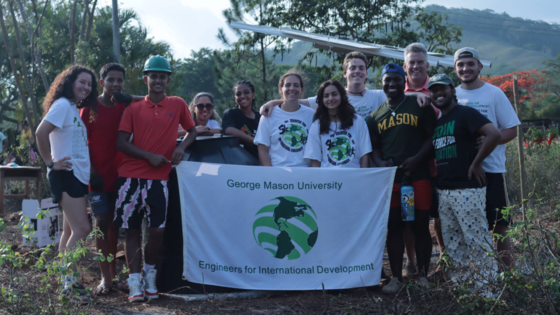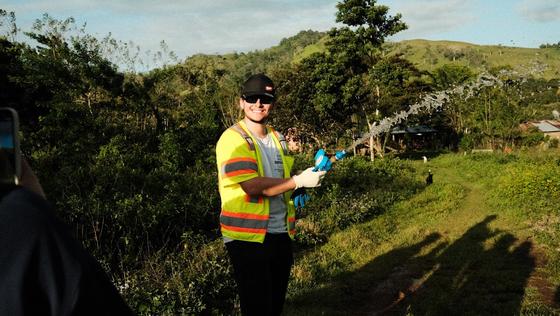In This Story
College students often learn some of their best lessons far away from the classroom and campus. George Mason University’s Engineers for International Development (EfID), founded by Professor Deborah Goodings, has completed service projects both domestically and abroad for over a decade.
With about 20 active members at any given time, the organization hosts speaking events on campus once a semester as well as service trips throughout the year, including an international trip every six months.

The organization is currently advised by Adjunct Professor Matthew Doyle, who works full-time as an Assistant Division Director of Wastewater Design Construction for Fairfax County. Doyle has been advising on international projects since 2008 in such countries as Peru, Ecuador, Nicaragua, and Costa Rica. Each project focuses on delivering water to communities in need. His first trip, to Nicaragua, was eye-opening.
“I watched little girls, eight- and ten-year-old girls, carry five-gallon buckets uphill,” he explained, adding that the children had to spend hours making multiple trips because they were not strong enough to carry full buckets of water. “In doing so, up and down the hill, they don't have time to do other things such as school,” said Doyle.

EfID students find and manage each project themselves, appointing an operations manager for each project. They are currently working on two projects in Costa Rica, providing a school with water and completing a mapping project.
EfID funds its activities through donations from such organizations as the Civil Engineering Institute and Fairfax County Department of Public Works and Environmental Services, as well as through competition winnings; throughout the year, students present their EfID work and complete challenges to win prize money.
As a sophomore, for example, EfID Vice President Philip Hunt presented at the Virginia Water Environment Assocation (VWEA) Student Design Competition, where George Mason has a winning record, having won first place in six of the past seven years.

Another significant source of funding has been the National Council of Examiners for Engineering and Surveying (NCEES) engineering competition, where EfID presents its international service projects in paper and poster form. Doyle said the team has a roughly 50 percent win rate, with each win bringing in $10,000 to $15,000.
Hunt has relished the networking opportunities provided by the organization, with graduate students, alumni, and industry professionals alike. He is particularly grateful to the active alumni network that remains involved with the organization.
EfID not only connects students with a devoted network of industry professionals, but it also provides real-world, meaningful opportunities to work hard, solve problems, and effect change in people’s lives.
